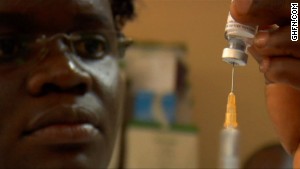Trial of Viagra on pregnant women stopped after 11 babies die
(CNN)Dutch researchers stopped a clinical trial due to the deaths of 11 babies from a lung disease after their mothers were treated with the drug sildenafil, commonly known as Viagra, while pregnant, Amsterdam University Medical Center announced Monday.
The mothers were part of a clinical trial to evaluate the safety and effectiveness of the drug on unborn babies who had severe fetal growth restriction and who faced significant risk of being stillborn or dying after birth, according to a study that detailed the design and protocol of the clinical trial.
Half of the 183 mothers in the trial had been treated with sildenafil while the other half were treated with a placebo. At the time they were treated, the mothers did not know which treatment they were receiving, which is standard in clinical trials.
"Fetal growth restriction happens when the growing fetus doesn't get enough nutrients or oxygen from the placenta," said neonatologist Dr. Mohan Pammi, medical director of the neonatal intensive care unit at Texas Children's Pavilion for Women in Houston, who was not involved in the Dutch study.
Want to become a human guinea pig? Here's what you need to know
It sometimes occurs because the mother has high blood pressure, uncontrolled diabetes or a condition called preeclampsia, he added. And babies born too small can experience a host of problems, including smaller head sizes, lack of blood flow to the intestines and death.
The hope was that the drug "can open up some blood vessels in the placenta and then can help the growth of the fetus," Pammi said.
But the Dutch researchers found that sildenafil was associated with the babies developing a blood vessel disease in the lungs and with an increase in the risk of death after birth. The condition is essentially a type of high blood pressure in the lungs.
A similar UK trial, the results of which were published in December, found no difference in neonatal deaths, and no adverse affects were linked to the drug. But that trial also failed to show a benefit.
High blood pressure in the lungs' vessels has been linked to low birth weight, Pammi noted.
According to the statement from Amsterdam University Medical Center, 183 women had participated in the clinical trial at 11 locations in the Netherlands since it began in 2015. Ninety-three women were treated with the drug, and 90 were treated with the placebo, or dummy pill.
Nineteen babies born to the women treated with the drug died, 11 of them due to the lung disorder. Six babies were born with the lung disorder and survived. In comparison, nine babies born to women treated with the placebo died, but none of them had the lung disorder. Three babies with the lung disorder were born to women who were treated with the placebo, and they all survived.
The statement from the medical center said sildenafil is sometimes used to treat women whose babies seem to not be growing well and noted that the practice will probably be discontinued. This is in line with the conclusion by the authors of the UK study, which recommended that "clinicians worldwide should stop prescribing sildenafil for this indication outside of research studies with explicit participants' consent."
The drug is made by Pfizer; spokeswoman Dervila Keane said in an email that the research is "an investigator initiated study and Pfizer have no involvement in the trial." She deferred all questions to the researchers.
Low birth weight contributes to 60% to 80% of neonatal deaths worldwide, according to the World Health Organization. Its worldwide prevalence is 15.5%, comprising about 20 million children born each year, but the vast majority of low-birth-weight cases -- 96.5% -- are in developing countries.
The development of the children in the halted study will continue to be monitored and the data further analyzed, according to the medical center.
The clinical trial of sildenafil is also being conducted in the United Kingdom, Canada, and Australia and New Zealand.
Dr. Katie Groom, associate professor of maternal and perinatal health at the University of Auckland and the chief investigator of the Australia and New Zealand trial, said these lung problems and deaths were not seen there, nor in the UK, although they are reviewing all of the cases in the trial to be sure.
Follow CNN Health on Facebook and Twitter
See the latest news and share your comments with CNN Health on Facebook and Twitter.
Dr. Ken Lim, Clinical Professor of the Department of Obstetrics & Gynecology at the University of British Columbia said in an email the trial in Canada was suspended. The trial there was started in 2017 and was still enrolling patients at three locations until it was halted after news of the deaths in the Netherlands.
"We are not aware of an increase in adverse outcomes among the 21 Canadian trial participants. We contacted the one Canadian woman who was currently in the trial, directing her to stop taking the drug or placebo. We will contact the 20 other Canadian women who have already participated in the trial," Lim said.
Groom said the research teams in all locations will "continue to explore our data in as much detail as possible within the consortium to workout if this finding is real or chance."
She noted that the drug is used to treat pulmonary hypertension, defined by the American Heart Association as high blood pressure in the heart to lung system, so "at first review it may seem unlikely that sildenafil has caused this problem. However, it is biologically plausible that withdrawal from the drug at birth has led to a rebound effect on the pulmonary vasculature," meaning the discontinuation of the drug at birth may have led to the complication.
Pammi said there are sure to be questions about whether and how sildenafil may have been responsible for the deaths and pulmonary issues in the Dutch study, which may involve looking closer at the dosage the mothers received, the timing and any differences in medical care the women receive in the Netherlands versus other countries.
"Maybe they do something differently," he said.
News Courtesy: www.cnn.com












